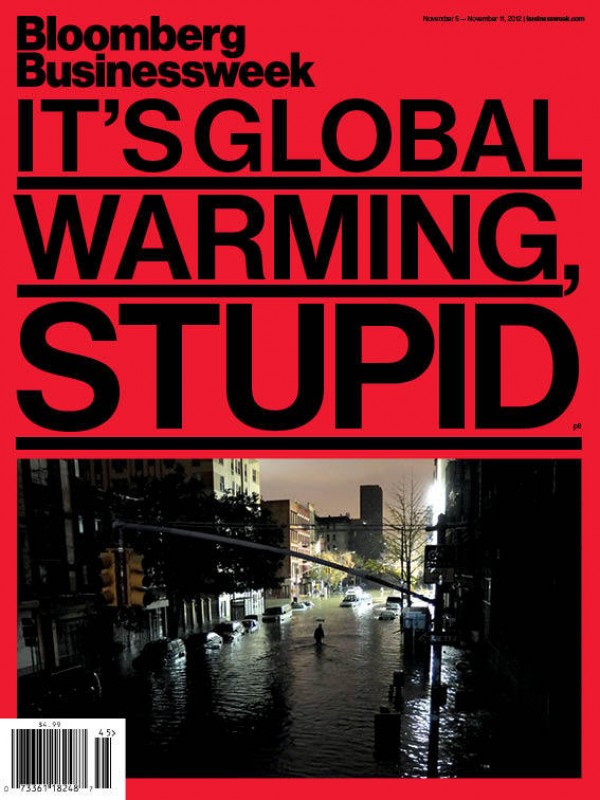BUSINESSWEEK: Yes, yes, it’s unsophisticated to blame any given storm on climate change. Men and women in white lab coats tell us—and they’re right—that many factors contribute to each severe weather episode. Climate deniers exploit scientific complexity to avoid any discussion at all. Clarity, however, is not beyond reach. Hurricane Sandy demands it: At least 40 U.S. deaths. Economic losses expected to climb as high as $50 billion. Eight million homes without power. Hundreds of thousands of people evacuated. More than 15,000 flights grounded. Factories, stores, and hospitals shut. Lower Manhattan dark, silent, and underwater.[…] Eric Pooley, senior vice president of the Environmental Defense Fund (and former deputy editor of Bloomberg Businessweek), offers a baseball analogy: “We can’t say that steroids caused any one home run by Barry Bonds, but steroids sure helped him hit more and hit them farther. Now we have weather on steroids.” In an Oct. 30 blog post, Mark Fischetti of Scientific American took a spin through Ph.D.-land and found more and more credentialed experts willing to shrug off the climate caveats. The broadening consensus: “Climate change amps up other basic factors that contribute to big storms. For example, the oceans have warmed, providing more energy for storms. And the Earth’s atmosphere has warmed, so it retains more moisture, which is drawn into storms and is then dumped on us.” Even those of us who are science-phobic can get the gist of that.
If all that doesn’t impress, forget the scientists ostensibly devoted to advancing knowledge and saving lives. Listen instead to corporate insurers committed to compiling statistics for profit. On Oct. 17 the giant German reinsurance company Munich Re issued a prescient report titled Severe Weather in North America. Globally, the rate of extreme weather events is rising, and “nowhere in the world is the rising number of natural catastrophes more evident than in North America.” From 1980 through 2011, weather disasters caused losses totaling $1.06 trillion. Munich Re found “a nearly quintupled number of weather-related loss events in North America for the past three decades.” By contrast, there was “an increase factor of 4 in Asia, 2.5 in Africa, 2 in Europe, and 1.5 in South America.” Human-caused climate change “is believed to contribute to this trend,” the report said, “though it influences various perils in different ways.” Global warming “particularly affects formation of heat waves, droughts, intense precipitation events, and in the long run most probably also tropical cyclone intensity,” Munich Re said. This July was the hottest month recorded in the U.S. since record-keeping began in 1895, according to the National Oceanic and Atmospheric Administration. The U.S. Drought Monitor reported that two-thirds of the continental U.S. suffered drought conditions this summer. MORE
THINK PROGRESS: “Climate-driven changes are already evident over the last few decades for severe thunderstorms, for heavy precipitation and flash flooding, for hurricane activity, and for heatwave, drought and wild-fire dynamics in parts of North America.” So concludes Munich Re, a top reinsurer, in a major new study that, for the first time, links the rapid rise in North American extreme weather catastrophes to manmade climate change.
 At the same time non-climatic events (earthquakes, volcanos, tsunamis) have hardly changed, as the figure shows. Prof. Peter Höppe, who heads Munich Re’s Geo Risks Research unit, said:
At the same time non-climatic events (earthquakes, volcanos, tsunamis) have hardly changed, as the figure shows. Prof. Peter Höppe, who heads Munich Re’s Geo Risks Research unit, said:
“In all likelihood, we have to regard this finding as an initial climate-change footprint in our US loss data from the last four decades. Previously, there had not been such a strong chain of evidence. If the first effects of climate change are already perceptible, all alerts and measures against it have become even more pressing.”
The 274-page study, “Severe weather in North America” draws on “the most comprehensive natural catastrophe database worldwide.” MORE
FORBES: Just a quick note on one part of Mitt Romney’s big speech. He didn’t simply dismiss global warming, or reject policies intended to address or mitigate against sea level rise, which is closely tied to global warming. Politicians do those things all the time. It’s ill-informed and irresponsible. But Romney took this a step further: he used the very idea of controlling sea level rise as a mere rhetorical device, a laugh line to mock Barack Obama‘s grandiosity. And he milked it for a few long seconds as the crowd at the Republican National Convention laughed. MORE
NEW YORK TIMES:In a surprise announcement, Mayor Michael R. Bloomberg said Thursday that Hurricane Sandy had reshaped his thinking about the presidential campaign, and he announced that he was endorsing President Obama….“The devastation that Hurricane Sandy brought to New York City and much of the Northeast — in lost lives, lost homes and lost business — brought the stakes of next Tuesday’s presidential election into sharp relief,” Mr. Bloomberg wrote in an op-ed article for Bloomberg View. “Our climate is changing,” he wrote. “And while the increase in extreme weather we have experienced in New York City and around the world may or may not be the result of it, the risk that it may be — given the devastation it is wreaking — should be enough to compel all elected leaders to take immediate action.” MORE

